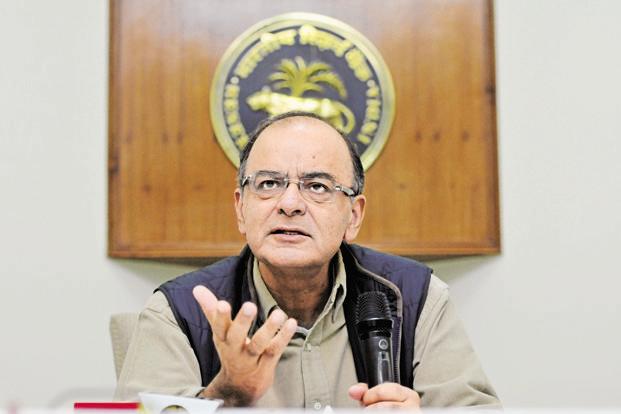Arun Jaitley defends multi-tiered GST structure
Live mint
By Asit Ranjan Mishra
Thu, Oct 27 2016. 08 52 AM IST
Arun Jaitley favoured a cess on luxury items and demerit goods for five years to compensate states for any loss stemming from implementation of goods and services tax.

Finance minister Arun Jaitley said the alternative proposal is to have a cess account and continue same existing levies as cess for a period of five years before subsuming them into the tax. Photo: HT
New Delhi: Finance minister Arun Jaitley defended on Wednesday the centre’s proposal for a multi-tiered goods and services tax (GST) structure, holding that a narrower slab regime will be regressive and highly inflationary for ordinary people.
In a Facebook post, Jaitley also favoured a cess on luxury items and demerit goods for five years to compensate states for any loss stemming from implementation of GST.
“Different items used by different segments of society have to be taxed differently. Otherwise the GST would be regressive. Air conditioners and hawai chappals cannot be taxed at the same rate. Total tax eventually collected has to be revenue-neutral. The government should not lose money necessary for expenditure nor make a windfall gain,” Jaitley argued.
Differences over the centre’s proposal in the GST council delayed a compromise on GST rates in the council’s last meeting last week. Expectations are that these differences are not insurmountable and are likely to be resolved at the next meeting of the GST council on 3-4 November.
A go-ahead from the council is key to the government being able to finalize the draft of supporting legislation before the last week of November. Passage of the central GST and integrated GST bills in the winter session of Parliament will be imperative to the roll-out of the landmark indirect tax reform by 1 April.
The centre proposed a multi-tiered rate structure—4% for gold, 6% on essential commodities where no excise duty is levied but a low rate of value-added tax is levied, two standard rates of 12% and 18% at which a majority of the items will be taxed, a higher rate of 26% for packaged consumer goods and 26% plus cess on luxury items and sin goods such as luxury cars, tobacco, pan masala and carbonated drinks. Items with a nearly 50% of the weightage in the Consumer Price Index basket, mainly food items, are proposed to be exempted from the levy of GST.
Giving a breakdown of how exactly the tax slabs will apply, Jaitley said items that are presently taxed at rates closest to the range of each of the slabs will be fitted into them.
“Those presently taxed below 3% as the total tax of the centre and the states will be taxed at a zero rate. Those between 3-9% will be taxed at a 6% rate, those between 9-15% will be taxed at 12% and there would be a standard rate of 18%,” he said.
Jaitley also said some developed countries like Ireland and France, which do not have any section of their population below poverty levels and where economic standards are high, have fewer tax slabs but many have 3-4 slabs.
On the issue of finding money for compensating producing states which may lose revenue initially after implementation of GST, Jaitley said there is no rationale for increasing direct tax rates for the purpose. For collecting the required Rs50,000 crore compensation amount in the first year, Rs1.72 trillion of tax would have to be imposed keeping in mind the 42% devolution to states mandated by the 14th Finance Commission.
“The tax impact of this levy would be exorbitantly high and almost unbearable,” Jaitley said.
Jaitley said the alternative proposal is to have a cess account and continue same existing levies as cess for a period of five years before subsuming them into the tax.
“This would include clean energy cess and cesses on luxury items and tobacco products, which in any case, presently also pay levy higher than 26%. This would ensure no additional burden on the tax payer and yet be able to compensate the losing States,” he added.